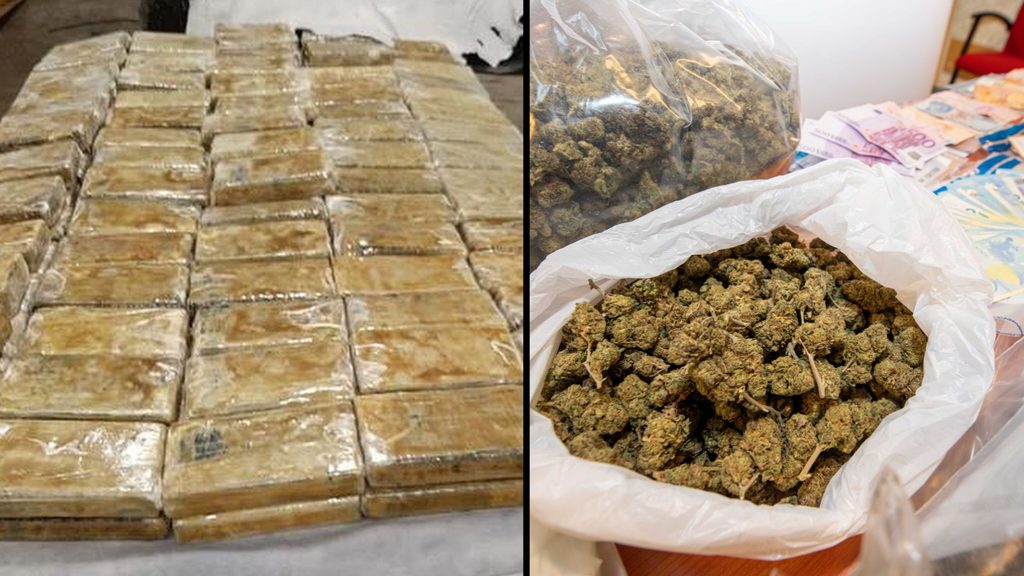Illicit drugs remain readily available in much of Europe and across all substance types. In its annual report on Friday, the European Monitoring Centre for Drugs and Drug Addiction (EMCDDA) revealed that 41 new substances were registered in 2022.
The report highlighted not only that the availability and production of drugs continue to expand in Europe; it also found that the substances are becoming stronger, with many of alarmingly high purity. It drew attention to the limited public knowledge about health risks.
Cocaine is the second most widely consumed drug on the continent after cannabis. It is now 43% purer than 10 years ago, increasing the health risks for users. Cocaine now plays a part in one in five overdoses in Europe.
Alternative cocaine import routes
In 2022, 303 tonnes of cocaine were seized in Europe – 110 in Antwerp. But authorities acknowledge that this is just a fraction of the total amount imported into Europe. The study cited the rise of organised crime groups targeting smaller EU ports and neighbouring countries. This expansion of smuggling routes may explain the stable price of cocaine, despite growing efforts to clamp down on the trade.
Apart from additional transport routes, the report highlighted a "well-established secondary cocaine production industry in Europe". In 2022, 34 cocaine laboratories were dismantled in Europe. The laboratories included "large-scale secondary extraction and cocaine hydrochloride manufacturing sites and an additional 14 cutting and packaging locations".
Increased cocaine use has also been shown in wastewater analyses – 37 of the 65 cities with data for both 2022 and 2021 saw a marked increase in the drug's consumption.
The most-used drug in Europe
Cannabis was by far the most prominent illegal drug on the European continent with around 22.6 million people aged 15 to 64 estimated to have used the drug in the last year. The report estimates that around 3.7 million adults (1.3 %) in the EU are daily or almost-daily users.
The report noted concerns about cannabis derivatives such as semi-synthetic cannabinoid hexahydrocannabinol (HHC). This was commercially sold in EU Member States as a legal alternative to the drug. But as well as complicating regulatory processes, the drug poses serious health hazards and has been banned in France after being classified as a narcotic.
The report also touched on heroin use in Europe and stated that it is the most commonly used illegal opioid. Of the 9.5 tonnes of heroin seized in the EU in 2021, 1.5 tonnes were intercepted in Belgium.
A number of other hallucinogenic, anaesthetic, dissociative or depressant substances are used in significant quantity in Europe. The report highlighted LSD, hallucinogenic mushrooms, ketamine, and nitrous oxide but stated that use is "not well monitored by existing surveillance systems", making it difficult to get a proper estimate.
Nitrous oxide (laughing gas) has become well-known in Belgium for its increased use as a recreational drug – as well as for causing explosions within Belgium's waste incinerators. It is linked to various health problems such as poisoning, burns and lung injuries.
The EMCDDA also reported 41 new psychoactive substances reported in Europe in 2022, bringing the total to 930 at the end of 2022. The health risks of these new compounds are usually unknown, "potentially exposing consumers to the risk of serious or even fatal poisonings or other health problems".
the Director of the EMCDDA, Alexis Goosdeel, stated that the "Support, don't punish" campaign increasingly looks to drug users as partners in the care and prevention system, RTBF reported.
Goosdeel believes that Member States now have the "means to take important political decisions" to help tackle drug-related organised crime. He cites Operation Sky ECC, when law enforcement infiltrated an encrypted communications system and dismantled a huge network of suspected criminal organisations.


